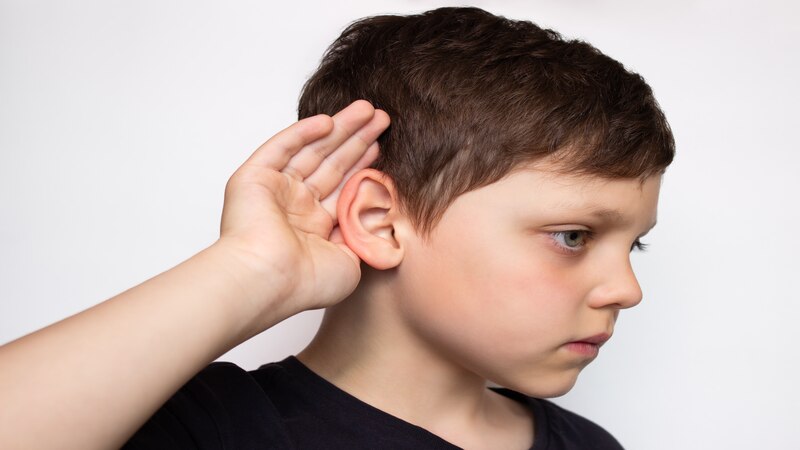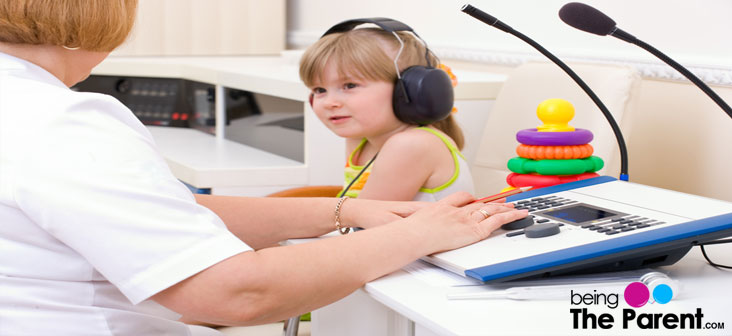
The ability to hear is very important in a child’s life. As the child grows his language and speech skills depend on his hearing ability. Hearing is an essential tool for a child for playing, learning and developing social skills. Children learn to communicate by imitating the sounds they hear. In recent past, hearing loss in children went undetected till the child reached the age of two. But nowadays most hospitals are having hearing screening for newborns and kids with hearing loss are identified and treated at a much younger age.
Is Hearing Loss Common In Children?
A research conducted by the Centers for Disease Control and Prevention (CDC) showed that 5 out of every 1000 children between the ages of 3 and 17 are diagnosed with hearing loss (Source).
Fortunately there are very few hearing losses that cannot be treated with modern technology. Early detection and treatment can help maximize a child’s hearing.
Signs That Your Baby Can Hear
As the baby starts growing there are certain indications that show that the baby is responding to sounds around him. When such signs are missing then a child is found to be having a hearing loss.
- 3 months : The child is able to recognize voices around him and responds with a cooing noise
- 6 months : The child is able to recognize all the familiar voices and sounds around him
- 9 months : The growing child is able to clearly understand words like Mom, Dad, Bye bye and their own names
- 12 months : The child is able to speak one or more real and recognizable words
- 18 months : The child understands simple phrases, familiar objects, and speaks about 20 to 50 words
- 24 months : The child is able to frame small phrases and sentences and is able to speak about 200 to 300 words
Signs And Symptoms Of Hearing Loss In Children
Here are some signs and symptoms to look out for if you think your child has problems while hearing:
- As the child grows it is noticed that the speech is not progressing as desired and there are speech and language delays
- The child speaks differently than others of his age and has problems articulating things
- When there is a sudden loud noise around, the child fails to get startled or wake up at the noise
- Your child takes a lot of time to understand what others are saying
- When there is a sound from another room the child is unable to respond to it
- Child suffers from frequent ear infections and ear pain
- The child does not respond appropriately to the questions he is asked
- While the child is watching T.V. he turns up its volume very high or sits very close to the television to hear
- Sometimes the child complains that he is able to hear from only one ear
- The teacher in school notices that there is a sharp fall in the performance and grades of the child
- The teacher also notices that the child is not able to respond as quickly as every other children in his class
- Lack of attention in the class as the child has problems hearing the teacher clearly
- The child is found to be speaking more loudly than the other students in the class
- When somebody is speaking to the child, you notice that he tends to look at you intensely as if trying to concentrate on what is being said. This can also mean that the child is trying hard to get visual clues for interpreting the speech

Causes Of Temporary Hearing Loss In Children
- Otitis media: It is a condition where the child has an infection developing in the middle ear. This happens when the tube that connects the middle ear to the nose is not fully formed. It also happens when there is fluid accumulation behind the child’s eardrum leading to an infection
- Ear wax: Buildup of excessive ear wax in the ear canal can also cause temporary hearing loss in children
- Cold: Excessive mucus in eustachian tube caused due to cold can also cause hearing problems in children
- Foreign objects: If a foreign object like a bead or tip of an ear bud gets stuck in the ear canal, then it can also lead to temporary problems in hearing among children
Causes Of Permanent Hearing Loss In Children
- Congenital hearing loss
Congential hearing loss means that the child suffers from hearing loss from birth. Congential hearing loss can be caused by both genetic and non- genetic factors. Some of these include:- Sometimes hearing loss can also be associated with the child’s genes. Hereditary conditions can cause the inner ear to develop abnormally causing hearing loss
- It can happen due to certain complications in pregnancy like exposure of the unborn baby to certain diseases like rubella that can affect the developing ears of the fetus
- When a pregnant mother is diabetic it can lead to hearing loss in children
- It can also happen in babies born prematurely or in low birth weight babies
- Any complications due to Rh-incompatibility can also cause hearing loss in a child
- Illness or injury: Various diseases like chicken pox, measles, flu, and meningitis can also lead to hearing loss among children. Head injuries or exposure to very loud noises can also impair hearing in children
Diagnosing Hearing Loss In Children
As mentioned earlier, in most hospitals hearing screening for newborns is done before they are discharged from the hospital. A baby who doesn’t pass the screening does not necessarily have a hearing loss. Usually a retest within 3 months of age is conducted to confirm hearing loss. If hearing loss is confirmed the doctors usually start the treatment. As your child grows up and you notice any signs or symptoms of problems with his hearing then take him to your family doctor who will do the primary examination and refer you to a specialist.

Treatment Of Hearing Problems In Children
Treatment for hearing loss in children depends on the cause and severity. Some ways of treatment include:
- Antibiotic: Initially the doctor would prescribe a course of antibiotics or certain medicines that can help cure temporary causes like otitis media
- Removal of foreign object: Removing any foreign object or wax plug is another way of treating hearing loss in children
- Insertion of ear tubes: If medications do not work, ear tubes are inserted that allow fluid to drain from the ear and thereby prevent infections from occurring. To insert these tubes a minor surgery is required after which the child is allowed to go home immediately
- Use of hearing aids: Hearing aids can be used by a child right from the time the child is a month old. This aid is inserted only under the instructions and guidance of an audiologist
- Cochlear implants: If all the above treatments do not work, then the doctor recommends the use of cochlear implant that is inserted in the inner ear which allows the child to hear better
If you suspect your child to have problems with his hearing, then the following people can be approached for help:
- A family doctor: If you feel that your child has difficulty hearing you then you can first take him to your family physician for primary checkup. If he feels there is problem with his hearing, he will then refer you to an ENT specialist
- An ear, nose and throat (ENT) specialist: For diagnosing hearing problems, the child will be referred to an ENT specialist. If there is fluid buildup or an infection or wax build up, an ENT specialist will clean it up or prescribe you necessary medication
- An audiologist: If your child has problems hearing, then depending on the severity of the problem, a hearing aid or any other amplification device will be required for your child. The audiologist will help you and your child through every step required for selecting, fitting, using and caring these devices
- A speech therapist: In a lot of children hearing loss also affects their speech. After they get hearing aids or cochlear implant, they would require speech language therapy. A speech therapist will help him catch up on any delays in his speech
Parent’s Role In Handling A Child With Permanent Hearing Loss
- Get educated about the problem: If your child is diagnosed with long term hearing problem, it is the responsibility of the parents to look up websites that can educate them about many options available to deal with the situation. They can also approach government and non-government organizations that can give an update to them about the latest research regarding treatment of hearing loss in children
- Bond with other parents in similar situation: As a parent of a child who has a hearing problem, it is advisable for them to connect themselves with other parents who are facing the same problem. Through online chats and social media, the parents with a child who has hearing problem can share their information, exchange advices and get a better understanding about the best solution to the problem
- Cordial and friendly approach towards your child: When the child realizes that he is having a problem with his hearing, he will feel isolated from his friends and family. It therefore, becomes a great responsibility on the part of the parents to handle the child with a lot of affection, patience and love. He should not become conscious of his disability. Hearing aids and early treatment can help reduce the chances of him feeling lonely
- Take care of yourself and your relationships: As a parent when you realize that your child has problems with hearing, it can be heartbreaking and traumatizing for you too. But this situation calls for a lot of patience from your end. You should take care of your well being as well your relationship with your family and spouse. Go ahead and do things you enjoy. Staying positive and happy will help you to better deal with the problem and also take care of your child in a more effective way
To conclude we can say that hearing loss is not a disease, and with timely attention, treatment and patience, this situation can be easily tackled.

